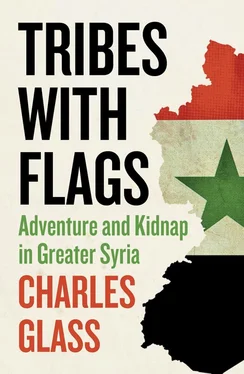I sat quietly for a minute trying to discern the sights in the room. Suddenly out of the darkness a waiter was standing in front of me. He had dark, greasy hair, and a moustache out of a 1930s film. He spoke to me in Turkish, which I could neither hear because of the music nor understand. I asked for “bira,” beer in Turkish and Arabic. He returned a moment later with a bottle of Tuborg, an empty glass on a metal tray and a tin dish with a few pistachios in it. He put the tray down on my small round table, and, with a flourish worthy of the uncorking of a bottle of vintage champagne, pulled the cap off the beer bottle. As delicately as any sommelier at Simpson’s with a choice claret, he poured the beer into the glass. Then he smiled and asked me to pay.
I did not understand. He repeated the price. I thought he said “bes” something. I recalled from the Farsi name for backgammon, “Shesh-Besh,” that “besh” was five. Perhaps he was saying “five something,” maybe 500. The band was still playing its loud, discordant music, so it was impossible to be sure. Was it 500 Turkish lira? I handed him a 500 lira note, a little less than one American dollar, but he shook his head. He wrote down a figure: 8,000.
“Eight thousand?” I asked, incredulous.
He nodded.
I did some quick figuring in my head. “That’s over ten dollars!”
He raised his eyebrows, then waved his hand to indicate the beer and the nuts. So, that explained it. With pistachios, a fifty cent bottle of beer cost ten dollars. Perhaps I had to take into consideration the cost of the entertainment and the presence of the girls at their private tables.
“That’s too much,” I said and stood to leave.
The waiter was clearly displeased, but he did not follow me or argue. The band continued playing its awful tune, and the girls sat as placidly as before. I walked into the blackness of the corridor and outside to the cool night. I knew that if I had been somewhere else, say Beirut, the waiter would have tried to force me to pay. He would have chased me and summoned assistance in the form of a security guard with ham fists and a .38 revolver. (In fact, that is exactly what had happened to me on my first night in Beirut in 1972.) The people here were mercifully more relaxed. I decided not to sample the delights of the Kazablanca, although a more serious investigator of the joys of Alexandretta’s night clubs would have persisted.
I walked along the same street to a normal, non-cabaret bar. It was open to the road with large windows and the inside was as lively as the Tanca Bar had been dead. Scores of mostly young men were talking and drinking beer, seated at stools along the curved, marble top bar or at the wooden casks which served as tables. There were no women – no bar girls, no wives or girlfriends, no young Alexandrettan ladies out on their own.
I ordered a pint of draught lager, which was served with a bowl of nuts by a smiling barman and cost 300 lira. The bar was not exactly clean or well lighted, but it was friendly and relaxed, and cleaner and better lit than the Tanca. There were two television sets, one in each of the two rooms separated from each other by the bar. They were playing the video of a Turkish thriller. In every scene, men were either punching or shooting at each other. In one segment, a group of men chased another group of men in cars. When nearly everyone was dead, the video ended and the barman turned it off and put on a cassette of Turkish pop music. But for the language spoken and the absence of women, it could have been a college beer bar anywhere in the Western world – young men in jeans, glasses of lager, music, a kitchen serving hot sandwiches. One man kindly offered me a beer and tried to welcome me into his conversation, but we discovered we had no common language. I tried English, French, Arabic and a few words of Spanish and Italian. He tried Turkish and what might have been Kurdish. He settled for a clink of glasses and a hearty pat on my back. What more could anyone ask?
At breakfast in the Arsuz Hotel, the old waiter in a uniform of black trousers, white shirt and tie, walked slowly across the terrace carrying breakfast on a tray. He tilted his thin body towards the table as he laid out the small breakfast dishes of olives, bread and white cheese. He poured tea from a tin pot into a cup and asked in Arabic if I wanted anything else.
“No,” I said. “Thank you.”
The waiter, whose name was Iskandar, Arabic and Turkish for Alexander, had somehow adopted me in my few days at the Arsuz Hotel. From the time we struck up a conversation in Arabic when I arrived, he would not let the Turkish waiters serve me. He was moody and would run his hand through his thinning grey hair and shake his head disapprovingly if I asked one of them for anything. He would always try to give me something extra, sometimes new green olives alongside the black, sometimes fried eggs, which I could see were not being served to the other guests. Despite his moodiness, he was a gentleman who moved and spoke with great dignity. He was proud that he came, not from this village, but from the ancient city of Antioch. He sympathised when I told him my shower that morning had been cold. Apparently, I was up too early for the sun to have had time to heat the water. I suspected he was solicitous because he enjoyed having a guest in the hotel who spoke his language, however badly and with however strong a Lebanese accent.
When I asked Iskandar where I could find a taxi to take me into Alexandretta, he advised me to save money by using the “dolmüs,” a taxi which picked people up and dropped them off anywhere on a fixed route.
“Why do you want a taxi?” he asked reproachfully. “Taxis cost 5,000 lira. The dolmüs is only 250.” In Turkey, the dolmüs was usually a micro-bus. Like the service in Syria, Lebanon, Jordan and Israel, the dolmüs was the normal transport for the poor. They called it “dolmüs”, here because it was “stuffed” with passengers, the way they called courgettes or vine leaves “stuffed” with rice and meat “dolma”.
When I reached the Ford micro-bus parked in the main square, it was already filled with fifteen people in twelve seats. We waited a few more minutes to stuff in another passenger before the bus began its journey north. The driver, his dashboard decorated with a turquoise stone to ward off the evil eye, stopped every so often on the way to let someone off or on, often leaving the road altogether to seek out passengers in the villages.
There were more women than men on the bus, and all of them, even the babies, wore gold earrings. The peasant women wore scarves with polka-dots or other designs in lurid colours over their hair. Women were not expected to have to sit next to men. We were about halfway to Alexandretta when a fat old peasant woman with a gold tooth pulled herself with both hands up the step into the bus. She examined us carefully and saw that the only empty seat was next to an inoffensive-looking young man. She hesitated, but finally sat next to him. When another old woman with hennaed hair noticed this unfortunate state of affairs, she picked up the small child next to her and sat him on her lap. She then invited the other old woman to sit where the child had been, an offer immediately accepted. Several people looked with disapproval at the young man, who had done nothing throughout this little drama.
In Alexandretta, Hind Koba took me to meet her elusive brother-in-law, Abdallah Tanzi, who lived in a flat a floor below her apartment near the sea. The building was a representative 1950s study in concrete with small balconies studded along its sides, and in her sister’s flat the reception rooms were typically Oriental, with heavy wooden dressers and tables, dark stuffed chairs and dark walls. Abdallah Tanzi was a friendly man in his late 60s, short, stout and bald. A friend of a similar age, taller and thinner, but just as bald, was visiting from Beirut.
Читать дальше












